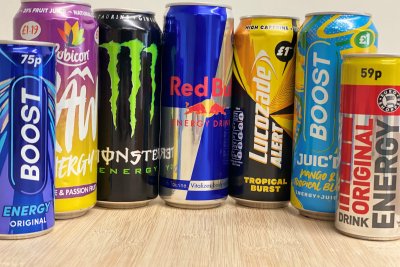The government is consulting on proposals to ban sales of high caffeine energy drinks to children, based on evidence of the harmful physical, mental and educational effects that consumption can have. Children's Food Campaign Manager explores why government should consider a legal age limit of 18, not 16.
According to the British Soft Drinks Association’s latest annual report, around 971 million litres of energy drinks are sold every year – with many of these containing high levels of sugar, sweeteners, caffeine and other stimulants such as taurine, ginseng and guarana. It is a sub-set of these drinks – those drinks with more than 150 mg caffeine per litre – that have been of greatest concern in terms of children’s health.
There is a strong body of evidence to underpin regulation, not least this meta-review study conducted by the FUSE team in the north east of England led by Professor Amelia Lake. The Government’s own consultation document points to effects including:
- increased frequency of headaches, irritation, tiredness and stomach aches
- reduced sleep duration and quality
- increased risk of emotional difficulties, such as stress, anxiety and depression
- increased risk of suicide
- association with poor academic performance
Furthermore, research also revealed health inequalities: young people in England living in poorer areas are drinking more energy drinks while numbers of young people consuming these drinks in wealthier communities are falling. There is also very strong public, parent and teacher support for regulating purchases by children. Research by Savanta for Children’s Food Campaign reveal 8 in 10 parents supported a ban on sales to children, whilst the Department for Education’s own survey revealed 82% of parents were concerned, and 61% of teachers agreed that high caffeine energy drinks negatively impact on the health and wellbeing of pupils at their school.
For these reasons, we have advocated restricting sales of high caffeine energy drinks to children and support the Government taking action. However, the current proposals to restrict sales only to under-16s do not go far enough to protect all children and young people. Here are 8 very good reasons that the government should seriously consider setting the age limit at 18, not 16.
1. 16 and 17 year-olds are still children by law
In England, Wales and Northern Ireland, a child is legally defined as someone who has not yet reached their 18th birthday. That means 16- and 17-year-olds are still legally children, regardless of how independent they are, or grown up they appear.
The UK has also ratified the United Nations Convention on the Rights of the Child (UNCRC), and this defines a child as under 18 unless "under the law applicable to the child, majority is attained earlier." The UNCRC requires states to uphold children's rights to protection from harm or damage to their health, as well as their access to nutritious food. 16 and 17 year olds deserve the same protections as every other child.
2. The warning label says ‘not recommended for children’, with no lower age limit.
Food Standards Agency regulations, which are reflected all across Europe, already require energy drinks containing more than 150mg of caffeine to be labelled 'not recommended for children'. It doesn’t say anything about children under 16 only.
This warning label is based on European Food Safety analysis which concludes a safe caffeine intake limit for adults might be 3mg per kg body weight but does not propose a safe limit for children. 16- and 17-year-olds are still in a biological developmental phase with high vulnerability to establishing unhealthy habits, sleep disturbances, mental health issues, and dependency development. Many young people have not reached an adult body weight by 16. Different children will also be at different stages of cognitive and emotional development, with some not yet ready to make adult-type decisions.
Restricting sales to all children is therefore most consistent with the label and underlying guidance on safe consumption of caffeine.
3. Maximising reach and impact
Independent research, including a survey of 2587 11-18 year olds, conducted by Professor Christina Vogel and colleagues at City St George’s Centre for Food Policy, revealed that the highest consumers of energy drinks were in the 16 to 18 age bracket. Omitting this vital age group from the regulation therefore makes no sense at all. Young people themselves don’t believe the voluntary bans don’t work.
Whilst some supermarkets have introduced their own policies on sales to under-16s since 2018, and the British Soft Drinks Association has also published guidance, these measures have been voluntary and therefore unenforceable. Meanwhile, many retailers and small shops continuing to sell freely, and children able to purchase with ease.
Implementing an age limit of 18 therefore not only captures the whole of the affected target group of children, but also would expand further impact beyond existing supermarket voluntary practice, thus creating an enforceable level playing field for every type of retailer. In short, much greater impact.
4. Consistency with regulations on other age-restricted products
Nearly all other age-restricted products, including alcohol, tobacco, vapes, lottery tickets and scratch cards are restricted at age 18, not 16. High caffeine energy drinks are largely sold in the same locations as these products. Setting the limit at 18 not 16 provides a consistent benchmark for shop workers, parents and young people alike. We note that when government initially introduced age restrictions on lottery tickets at 16, in 2021 this raised to 18, on the basis of increasing protection of young people from harm. Experience from tobacco legislation suggests that a higher age limit strengthens norms, reduces social normalization, and limits availability among younger people. Government can learn from the past in effectively introducing age-restrictions for consumer products.
5. Clarity and support for education settings
Setting a ban only at 16 means there will be a much larger cohort of young people still in secondary school taking GCSEs or A Levels who can still legally buy energy drinks on the way to school, making it much harder for schools to enforce their own policies and deal with the effects of consumption. The DfE survey revealed 79% of secondary school teachers saying pupils at their school can easily access energy drinks.
In other studies, teachers have also observed that pupils consuming these drinks are more likely to display symptoms including hyperactivity, disruptive behaviour, lethargy, tiredness, headaches and even heart palpitations. This dynamic could also increase peer pressure and trade between older and younger students. Raising the age to 18 is the best approach for strengthening school policies and limit the number of pupils able to purchase legally.
6. Delivering effective enforcement
The government has suggested that under-16 is easiest to achieve because it reflects what some supermarkets are already doing, and is therefore least disruptive. However, it is worth noting that these have been voluntary, rather than formally enforced measures, with penalties for non-compliance. All sales of age-restricted products will require proper systems of visual checks and proof of age verification. We believe vendors of all types could more easily adapt existing measures used for alcohol, tobacco, vapes and lottery tickets, such as Challenge 21/Challenge 25, against restrictions if they were set at 18.
Enforcement and compliance might also be more challenging given 16- and 17-year-olds are less likely to carry a reliable, official form of photo ID than adults, and young people people from more disadvantaged backgrounds may face additional inequalities in accessing a recognised form of photo ID. For example, young people may apply for a provisional driving licence from the age of 16, 32% of those in the lowest income quintile do not have access to a car, compared to just 7% in the top quintile, plus the cost is £34. A passport currently costs £94.50 for anyone aged 16 or over.
7. Alignment with international best practice
18 is most consistent with regulations in most other European countries. Lithuania, Latvia, Estonia, Poland and Hungary have all introduced national restrictions on selling high caffeine energy drinks sales to under-18s. The only country so far to legislate below this age limit is Norway, where the national health institutes also advocated an age limit of 18, and have pushed for this to be kept under review. The UK has stated its ambition to show leadership in creating the healthiest generation of children, and we strongly recommend aligning with the most robust of international best practice.
8. Adults only! It's the clearest message for everyone
In Children's Food Campaign's latest polling conducted in November 2025 by Savanta, 56% of parents agreed with an under-18 age limit, compared with just 35% who thought it should be set at under-16. When asked why they supported this option and not 16, comments included:
"It should be for adults only"
"It's not healthy and so should be pushed to 18 for people to decide for themselves."
"18 is no longer a child"
"Because they are still classed as a teenage person and still growing - energy drinks are bad for you"
"Because they are still developing"
"I feel 16 and 17 year olds are still children."
Whilst parents recognise that at 16 some young people want to make their own choices and take on adult responsibility, not all are ready for this at 16. Parents see a clear correlation between 18 and the age of adulthood. An 'adult only' message is absolutely clear for everyone.
Parents also support additional enabling measures to ensure any ban is well communicated. There is overwhelming support for clearer warning labels and restrictions on advertising online, on TV, outdoors and via sports sponsorship, as well as a public awareness campaign about these drinks being not suitable for children that is understood by young people, parents and shopkeepers alike.
In short, as this discussion between parents and academic research experts on energy drinks argues, not recommended for children means all children. We urge the government to be bold, and boost their proposed high caffeine energy drinks age restrictions to limit sales to adults only, and that means 18, not 16.
Join the consultation
The Government's consultation on restricting the age of sale of energy drinks to children is open until 11.59pm on 26 November 2026.
Credit: Barbara Crowther | Sustain
Children's Food Campaign: Campaigning for policy changes so that all children can easily eat sustainable and healthy food.








